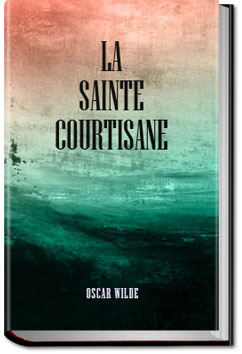

Some years after Wilde's death I was looking over the papers and letters rescued from Tite Street when I came across loose sheets of manuscript and typewriting, which I imagined were fragments of The Duchess of Padua; on putting them together in a coherent form I recognised that they belonged to the lost Florentine Tragedy. I assumed that the opening scene, though once extant, had disappeared. One day, however, Mr. Willard wrote that he possessed a typewritten fragment of a play which Wilde had submitted to him, and this he kindly forwarded for my inspection. It agreed in nearly every particular with what I had taken so much trouble to put together. This suggests that the opening scene had never been written, as Mr. Willard's version began where mine did. It was characteristic of the author to finish what he never began.
When the Literary Theatre Society produced Salome in 1906 they asked me for some other short drama by Wilde to present at the same time, as Salome does not take very long to play. I offered them the fragment of A Florentine Tragedy. By a fortunate coincidence the poet and dramatist, Mr. Thomas Sturge Moore, happened to be on the committee of this Society, and to him was entrusted the task of writing an opening scene to make the play complete. {1} It is not for me to criticise his work, but there is justification for sayi
Get ALL YOU CAN BOOKS absolutely FREE for 30 days. Download our FREE app and enjoy unlimited downloads of our entire library with no restrictions.
Have immediate access and unlimited downloads to over 200,000 books, courses, podcasts, and more with no restrictions.
Everything you download during your trial is yours to keep and enjoy for free, even if you cancel during the trial. Cancel Anytime. No risk. No obligations.
For just $24.99 per month, you can continue to have unlimited access to our entire library. To put that into perspective, most other services charge the same amount for just one book!

As avid readers, we understand the joy of immersing ourselves in a captivating story or getting lost in the pages of a good book. That's why we founded All You Can Books back in 2010, to create a platform where people can access an extensive library of quality content and discover new favorites.
Since our founding days, we’ve continuously added to our vast library and currently have over 200,000 titles, including ebooks, audiobooks, language learning courses, podcasts, bestseller summaries, travel books, and more! Our goal at All You Can Books is to ensure we have something for everyone.
Join our community of book lovers and explore the world of literature and beyond!